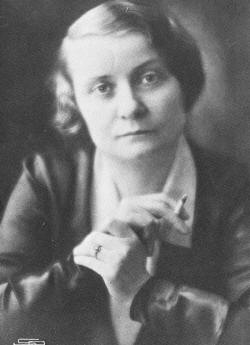

Queer Places:
Helsinki Orthodox Cemetery
Helsinki, Helsinki Municipality, Uusimaa, Finland
 Alli
Hagar Olsson (16 September 1893 – 21 February 1978) was a Swedish-speaking
Finnish writer, literary critic, playwright and translator.[1]
Alli
Hagar Olsson (16 September 1893 – 21 February 1978) was a Swedish-speaking
Finnish writer, literary critic, playwright and translator.[1]
Edith Södergran found a literary supporter in Hagar Olsson. Their friendship began through correspondence in January 1919. Biographers have been almost neurotically keen on Södergran having a potential male lover and they have ended up describing Olsson and Södergran's relationship only as intellectual friendship, yet other interpretations can be made as well. Södergran and Olsson met for the first time in February 1919, when Olsson visited Södergran's place in Raivola. Södergran was ravished. Inspired by Olsson, she wrote a series of ‘sisterhood-poems’ in her third poetry collection, Rosenaltaret (The Altar of Roses, 1919). Olsson and Södergran met only six times. In her letters Södergran begged Olsson to visit Raivola again, since Södergran's financial and health problems limited her own travelling. But Olsson was occupied with her work in Helsinki, where she also had other affairs during these years, both heterosexual and homosexual.
In the summer of 1923 Olsson was travelling in Italy when she received word of Södergran's death. Olsson has described it as a shock because she was not aware of the critical state of Södergran's health, and feelings of guilt were to follow Olsson all her life. Södergran had given Olsson a ring that she called ‘the ring of sisterhood’. Olsson would carry the ring all her life, and she also wished to be buried with it. As her heritage for later generations of lesbian readers, Södergran has left the poems of sisterhood, where longing, jealousy and love between two women were given a virtuous expression.
Olsson was born in Kustavi. In 1965 she received the Eino Leino Prize.[2] She died, aged 84, in Helsinki.
My published books: